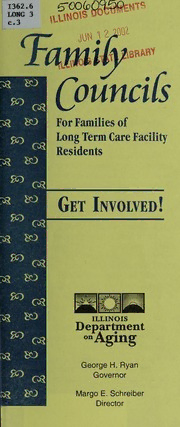
Family councils for families of long term care facility residents : get involved! PDF
Preview Family councils for families of long term care facility residents : get involved!
1362.6 iu»o\s LONG 3 c.3 ^3 SO For Families of Long Term Care Facility SO 03 Residents 33 SO *» 03 ^ so Get Involved! 20 03 33 SO SO 03 33 SO SO 03 33 SO ILLINOIS Department SO on Aging 03 SO 38 George H. Ryan SO Governor 03 SO Margo E. Schreiber Director Family Council? Definition A independent family council is an (self-led and self-determining) group of families and friends of residents that protects and improves the quality of life for residents and provides families with a voice in decisions that affect their loved ones. A family council can be the catalyst to assuring residents receive care that meets their individual needs, preferences and schedules. A family council can be likened to a Family Support Group, Friends of Residents, or Quality of Life Advocates; and it can function effectively and independently. Rights Families are guaranteed the right to form and hold regular meetings of a family council in the 1987 Nursing Home Reform Law. Federally certified facilities must promote and support family councils and non-certified facilities should want to support family councils by: ■ Providing private space within the facility for a family council to meet privately; ■ Designating a staff liaison to provide Facility staff assistance when needed. can attend meetings only when invited; and ■ Listening and responding to the grievances and recommendations of residents and families concerning resident care and life in the facility. ILLINOIS STATE LIBRARY ...Piiliilll I []L041745 T Getting Started First Steps ■ Ask family members of facility residents to join you in starting a family council. ■ As a group of families, approach the facility administrator about starting a family coun¬ cil. The support of the administrator can only positively affect a family council’s success. (NOTE: Support does not imply atten¬ dance at council meetings.) ■ Contact your local ombudsman for techni¬ cal support, information, and resources. ■ Set a time for the first meeting. ■ Publicize the meeting by posting flyers, handing out invitations, face-to-face con¬ tact with visiting families, announcements in the facility newsletter and local newspa¬ pers, etc. Ask the facility to send a letter to all family members along with the billing. Meeting ■ Explain the importance of group independence. ■ Explain the benefits of a family group. ■ Establish ground rules for sharing concerns. It will be important to allow time for individual concerns, but the council must go the next step and work with the administrator to improve identified problems. ■ Appoint a temporary chair, vice chair and secretary until the group is organized. ■ Make arrangements for the next meeting. Staying Vital Next Keeping Families Interested and Empowered ■ Council meetings should be scheduled regularly enough to hold families’ interests. ■ Develop and follow an agenda at each meeting. ■ Continue recruitment efforts — posters, face-to-face contact, council information included in admissions packet, etc. ■ Identify 1 or 2 facility-wide concerns and develop strategies and action plans to improve conditions. ■ As a group, take concerns to staff, estab¬ lishing a strong, cooperative link between facility staff and family members. ■ Plan special events and activities to supplement the facility activity program and to avoid focusing solely on individual concerns. ■ Have educational / informational sessions about facility and long-term care issues. ■ Establish a system to address individual concerns, e.g., a committee or occasional set times during meetings to discuss individual concerns. ■ Meet regularly with the local ombudsman for technical support and to identify valuable resources. ■ Develop a system (e.g., phone tree, e- mail) to reach council members for support and problem resolution outside of the regularly scheduled meeting times. ■ The key to moving away from an individual concern focus is to inform and empower families to be their own advocates. Everyone Wins ! Benefits For Families: ■ Orientation, support, and information for the families of new residents. ■ Ongoing mutual support — strength drawn from shared experiences. ■ Education and information related to the long term care system, e.g., residents’ rights, Medicare reimbursement, etc. ■ A means to express concerns and solve problems. For Residents: ■ Family input into care decisions and facility changes. ■ Council sponsored activities and events to supplement the activity program. ■ Support and protection for residents who do not have concerned families or friends. ■ A connection to the community outside the facility. For Facility Staff: ■ Two-way communication between the facility and families. ■ The council can be a sounding board for new ideas. ■ Family input to aid staff in problem¬ solving. ■ Means to know residents and families better — their past experiences, likes and dislikes, etc. ■ Family council may sponsor staff appreciation events. Illinois Department on Aging’s /J Long Term Care jf Ombudsman Program supports the Pioneer Practices and quality of life for residents. The name and number of your local Long Term Care Ombudsman is available at www.state.il.us/aging/; or call the toll-free Senior HelpLine: 1 800 252-8966 - - (Voice & TTY) ——————— or call: . UNIVERSITY OF ILLINOIS-URBANA 3 0112 121935263 Long Term Care Ombudsman services available under the Older Americans Act are provided at no charge; however contributions are gratefully accepted and will help to make services available to more seniors. 421 East Capitol Ave., #100 Springfield, Illinois 62701-1789 ILLINOIS Department FAX: 217-785-4477 on Aging www.state.il.us/aging The Illinois Department on Aging does not discriminate in admission to programs or treatment of employment in compliance with appropriate State and Federal statutes. If you feel you have been discriminated against, call the Senior HelpLine at 1-800-252-8966 (voice and TTY). Printed by Authority State of Illinois IL-402-1080 (5/02)
